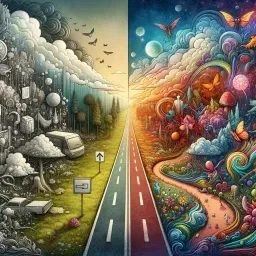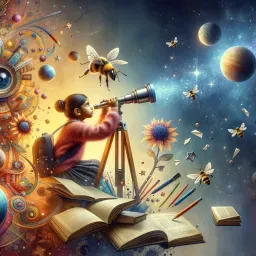”We cannot solve our problems with the same
thinking we used when we created them“

- Meaning
- The phrase implies that our current mindset may be a barrier to resolving issues that we ourselves have set in motion. It suggests that fresh insights and perspectives are necessary to break from habitual patterns of reasoning that perpetuate problems. Philosophically, it aligns with the ideas of creativity and cognitive flexibility, where innovative solutions require divergent thinking rather than reliance on past patterns or methods.
- Allegory
- The image elements, such as the contrasting light bulbs, represent the duality of old and new thinking. The tangled web symbolizes the complexity of problems that arise from outdated thought processes, while the bright light bulb embodies hope and the potential for innovative solutions. The diverging path signifies the journey of exploring new avenues in thinking and problem-solving, encouraging viewers to break free from conventional limitations and embrace creativity.
- Applicability
- This phrase can be applied in personal life by encouraging individuals to embrace new approaches to challenges, such as learning new skills or seeking different viewpoints before attempting to solve problems. It reveals the importance of self-awareness and the willingness to evolve one's thought processes in both professional and personal settings.
- Impact
- The phrase has significantly impacted discussions around innovation, leadership, and creative thinking, often cited in educational, psychological, and business contexts. It has inspired movements focused on critical thinking, problem-solving methodologies, and organizational development, making it a go-to reference in leadership training and self-help literature.
- Historical Context
- The phrase likely originated in the early to mid-20th century, paralleling the rise of modern psychology and systems thinking, emphasizing that the root causes of issues often lie in outdated ways of thinking. It resonates well with the post-World War II era's emphasis on innovation and change in various fields, including science, technology, and social change.
- Criticisms
- Criticism of the phrase may arise from arguments asserting that certain problems require traditional approaches or that some contexts benefit from applying established methods. Detractors might argue that deviation from tested solutions can lead to insecurity or failure, emphasizing that a balanced approach—combining new ideas with experience—is necessary for effective problem-solving.
- Variations
- Variations of this phrase exist in different cultures. For instance, in Chinese philosophy, a similar notion is reflected in the concept of '新瓶装旧酒' (new wine in old bottles), which suggests that using outdated paradigms in newly unfolding contexts will not yield successful outcomes. The way cultures interpret the need for change emphasizes the universal understanding of innovation and adaptability in problem resolution.
-

You never fail until you stop trying.
-

Insanity is doing the same thing over and over again and expecting different results.
-

Logic will get you from A to B. Imagination will take you everywhere.
-

The problem is not the problem. The problem is your attitude about the problem.
-

The important thing is not to stop questioning. Curiosity has its own reason for existing.
-

All it takes is faith, trust, and a little bit of pixie dust.
-

I have no special talent. I am only passionately curious.
-

It’s kind of fun to do the impossible.
-

A person who never made a mistake never tried anything new.
-

He who fights with monsters should be careful lest he thereby become a monster.
-

Anyone who has never made a mistake has never tried anything new.
-

Hey, if nothing lasts forever, then everything is just the stuff of now.
No Comments